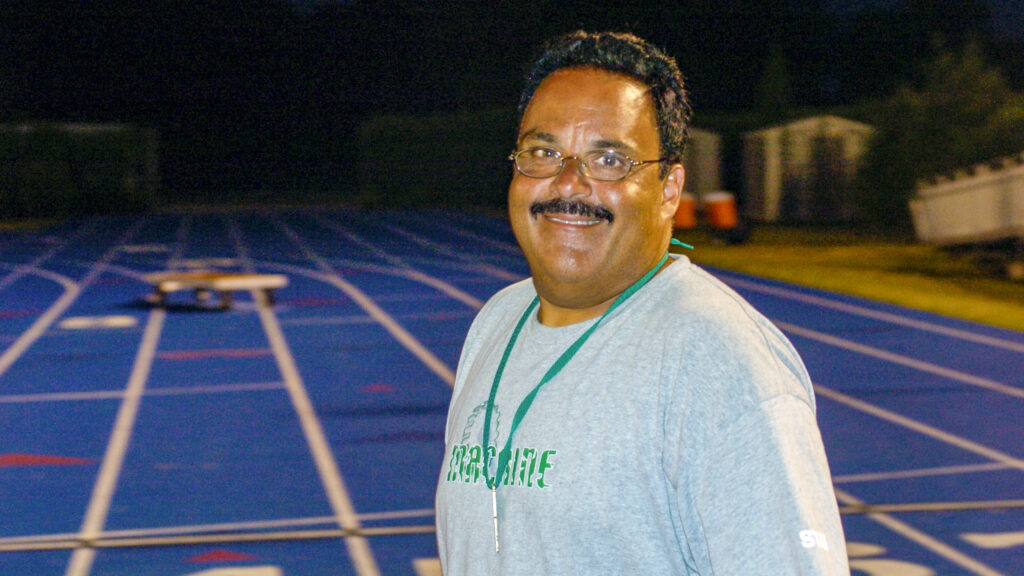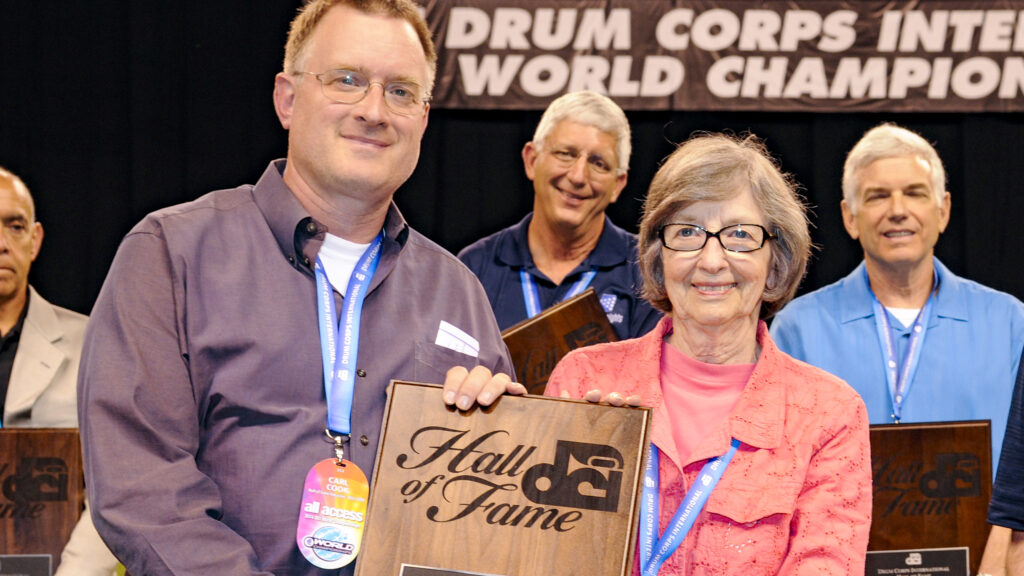Here’s part two of Mike Boo’s interview with Frederick Fennell, who turns 90 today. While at the 2001 World Championships, Dr. Fennell presented an informal talk to a number of Drum Corps International judges, with questions presented by yours truly. The following is a transcript of that talk.

I’ve been fortunate not to be stuck in a pigeon hole, and since I’ve never been stuck, I’ve been able to look at things as they are. So many people in our profession, like the old horse, are wearing blinders. I certainly couldn’t have done what I did in my career if I wore blinders. I had the opportunity to be myself and do the things I was interested in.
For me, it’s basically been a literature matter. For the corps, it certainly is a literature matter, but it’s literature to a multiple purpose. If you want to play part of “Pictures at an Exhibition,” you can switch the movements around. You don’t have to have them in the same order in the original order. So that the show has the contour you need, you have to adapt for time and your needs.
The short piece allows you to do your thing and be on to the next piece. It’s a different tempo, a different style; it’s constantly on the move. To play a horn that well while moving around, well, 99 percent of the school bands in America can’t do it sitting down. They don’t do it, don’t play with dynamic contrast, don’t play with tonal contrast. Sometimes you’re pretty lucky to get them in the room, or to get the rehearsal to become part of the school schedule.
So I think what all of you already know is so true: Drum corps is such a disciplined activity, you couldn’t do 30 seconds without discipline. And this is in many places a dirty word. “Discipline? What do you mean? I’m disciplined.” But you can’t begin to think about doing something like this without discipline.
Now, discipline is a much misunderstood word. It isn’t always just slapping someone across the face. It’s establishing a point that is a constant point that you always do, and not just do part of the time. I couldn’t help but watch Santa Clara Vanguard respond during the rehearsal Tuesday night when the person in charge said, “Reset.” Everybody moved, immediately, not when they felt like it. Everybody moved and in 15 seconds the formation was already set up again. That’s discipline. I don’t see how you could get it done if you didn’t have that.
And I found it to be such a joy, such a pleasure to see the rehearsal, is that everybody knows the music, all of the music. Everybody knows all the music, not just their part, but they know what’s happening with their neighbors; what’s happening with the high brass, what’s happening with the low brass, the percussion. They know. The whole show is an entity to them, a single idea.
The mere fact that everybody knows the music is another thing is most admirable. They know exactly what they’re playing when they get to that formation, and what they’re playing on the way to that formation. That’s striking, because I know so many high-standing ensembles who couldn’t even think about doing anything like that. That’s too bad, because I know an awful lot of time is wasted on unplanned rehearsals.
These drum corps couldn’t have an unplanned rehearsal. The player knows what’s going to be involved when a show begins talked about, then taught section-by-section. That, among practicing ensembles in our country, is unique and extraordinary.
I wish it were possible to convince a person who has an unhappy idea about it to come and attend a rehearsal. With nobody saying anything to them, they would just watch, just listen, just observe what’s happening.
As I said to the players in Santa Clara, this is their idea, nobody tells them they have to do this. This is their idea, and they’re there because of that, and what they put into it is therefore a maximum commitment of time and musicianship; with their own family, brothers and sisters, girlfriends, boyfriends, all kinds of things. It’s a time when everybody knows what they’re doing.
A lot of people don’t know that. They just go through motions, with no relationships of one thing to another, and I very much admire what I saw yesterday at Division II &III Finals and what I expect to see today at quarterfinals.
Boo: Do you think there’s any literature inappropriate to this sort of venue?
Fennell: It must have been 40 years ago I heard a drum and bugle corps play the “St. Louis Blues” with a raised third, but that was a long time ago. Finding a theme, finding a piece of music that will either reveal an encouraging idea to develop, that’s always interesting to find. When you can find pieces that have that variety and fit the time frame within when you have to prepare it, it means there is a continuity of ideas, and therefore the music that is written for you makes all the difference in presentation.
Boo: You’ve mentioned the use of numbers, of things you’re going to try yourself.
Fennell: We deal in that well-known series of Italian phrases that establish movement, color, and dynamics. At least we think they do, and they obviously don’t, because the most average of the school bands I hear have no idea whatsoever of these matters. Except for the fewest of the school groups, brought together by auditions for an all-state or all-county festival, most sit-down groups can’t begin to play like your groups do; marching backwards, sideways, whatever, understanding these different levels of sound, these different qualities of attack and release.
So I was very intrigued by this that from up on top, word could come down to the bass drums, “That was a three, what do you think that should be?” And the bass drums said, “A two.” “OK, play a two.”
Using numbers as a method of measurement is very intriguing. It’s something I’m going to try. Pretty much the character of music is right there, so that isn’t a problem; but nuance and dynamics are real problems. In most cases, you’re lucky if the right buttons go down before you start thinking of the subtleties between mp and mf. There is interest in Italian.
Most of the time, one isn’t reminded that the words are Italian and that they came from these places where the first organization of materials happened to come about. Everyone understood the language all those years ago and it just stayed with us until guys like Wagner decided it was time we carried this information in German, which he did, and endeavored to express in his own language what music should sound like. Debussy did the same in French.
When we got to the United States, we continued Italian, because that made it music to us, and this is one of the things that continue to get in the way of making real music. It’s too bad. So if I’m lucky I’ll get a chance to try to the numeral system before I can’t stand up anymore.
Boo: What are your impressions of the activity? One of the things that concerns the people who organize this association is the marketability to the audience. Is there something so obvious we’re missing that could enhance the effectiveness of our programs?
Fennell: It’s difficult in this short time of immersion of it all to come up with some sort of valid observation. I’m under the impression that things are constantly changing.
Boo: What about the use of flags, the non-playing instruments?
Fennell: That’s been inherited. It has grown to be huge part, so the music ends when the rifle comes down in someone’s hand. That’s the cut-off. Everybody’s looking for that, it’s all gauged to fall in the hands and the players are watching to cut-off when it does. They employ everything, as long as it is something they can throw, twirl or carry around. And it’s done with remarkable ensemble precision.
I was still a twirling drum major when a man tried to bring from Switzerland the element of Swiss flag throwing, with a flag on both ends. But it never caught on.
The flag is such a rhythmic part of what is happening.
Boo: How about all the percussion writing?
Fennell: I said last night [at quarterfinals], “The arrival of the ever-expanding pit has taken the customary pair of cymbals off the field.” And then the next group had three pairs on the field, just to make my point wrong. It seems to me that what cymbals contribute to the field is being taken care of in the pit. I felt as many as eight pair of cymbals didn’t have as much sound as cymbals should have. They’re too thin, they should be thicker, should have a destructive quality to them. In the old days, the crash was there. At the end, you knew you had been through something. The cymbals mounted as suspended cymbals didn’t fulfill the cymbal sound to me. I didn’t hear that wonderful crash. They must be thicker and bigger.
Boo: Did the keyboard playing project?
Fennell: Oh yes. The keyboard playing was excellent last night. To get just the right mallet makes all the difference in the world. The low part of the big marimbas, very luscious and rich, should be exploited as much as you can. As long as amplification comes from the marimba itself and not someplace else, amplification should be acceptable. Of course, you have cables and more to be concerned with. We should not pass up with the glockenspiel contributions. There are some times when the little top notes pop out and it could set that chord off from all the rest of the chords.
Boo: Do you feel the sound of the drums has changed for the better or the worse?
Fennell: I think you might as well be playing on marble, because that’s the sound you’re getting.
I had a real fun time when I was invited this year to do a concert at the Library of Congress. At the end of the program, they brought out a Civil War drum, and I brought my ebony sticks that I started with when I was 7 years old. I just felt this wasn’t going to be complete without them hearing one of the things those Civil War drummer boys had to learn. Of course, these boys were musically illiterate, I’m sure.
The fulfillment of the well-known stickings of the drum put down by Bruce and Emmett, the latter the composer of “Dixie,” were what these boys had to know. Previously, they had a hard time getting this from any kind of written material. In some cases there were just two lines with things pointing up meaning the left stick and things pointing down meaning the right stick. When they developed the rudiments, these people were looking at each other like, “What kind of language is this?”
So, I played a number of the rudiments to show what the boys had to learn: Ruffs, drags, ratamacues. Then four piccolo players played out of my book. I wound it up by getting up my courage to knock off “Connecticut Halftime.” Bill Ludwig and I go off to Civil War battlefields, and we march the fields and play our drums.
The drum was used to announce the commands of the leaders in battle. But as musketry became more active, the bugle had to take over as the drumming sounded too much like the shooting, and no one could tell who was doing what. After one particularly bad battle, a bugler came up to General Butterfield, saying, “General, we have to do something. No one can tell when it’s our bugles.” So they created a unique bugle call to precede all their commands, so the troops could tell the bugle call was for them.”
The incredible left-handedness of the Madison Scouts member who won the Individual/Ensemble competition was incredible, but he can only use it in this venue. There is no venue other than this out there.
I must say, I miss the sound of the old rattling drum, while I admire the today’s techniques, which use everything; including the rim and shells.
Think about this for a moment: In 1933, I became the first percussion major and first graduate of the Eastman School of Music in percussion, and they were the only school of a college or university in the United States where you could earn a degree as a percussionist. Now look at it. There is a teacher of percussion at almost every school in the United States. A plethora of students are interested in reading, and are taught from the beginning that percussion is more than just the skins.
Now, in the pit, you have it all. The pit takes care of the things the field percussion should not do or can’t do. If there’s any improvement to be made, I think amplification of the marimba with a speaker on front would do it. They wouldn’t have to force anything. It would give them control over the projection of the instrument.
Boo: What should visual judges know about music and what should music judges know about the visual side to become better judges?
Fennell: As much as they can. The importance of the visual is movement; therefore the contact with the music is very important, too. No one expects someone to suddenly find a brand new approach to music, but it’s there. I think it has everything to do with general effect. An interest in the music would be a good place to begin, as well as an interest in the movement.
As you all know, there is almost nothing in any marching playing show I’ve heard that beats silence … after which, the group explodes. So I say, don’t forget about the silence. And while the bells turning to you can part your hair, the beautiful sounds that can be made on the quiet end of the brass are absolutely organ-like. Twenty baritones is quite a sound to be exploited. There’s much effect in this wonderfully controlled low sound. I don’t think there’s any substitute for that. And if that’s appropriate to something in the show, don’t forget about it, as the emotion of that reaches more people than the high end.
Boo: What should every music judge be aware of?
Fennell: Knowing the music aspect as well as possible would be an absolute necessity. But as that is going by, they need to filter out that movement has everything to do with that sound and that music. There’s motion because it’s a moving outfit. Everything’s a part of everything else on that field.





